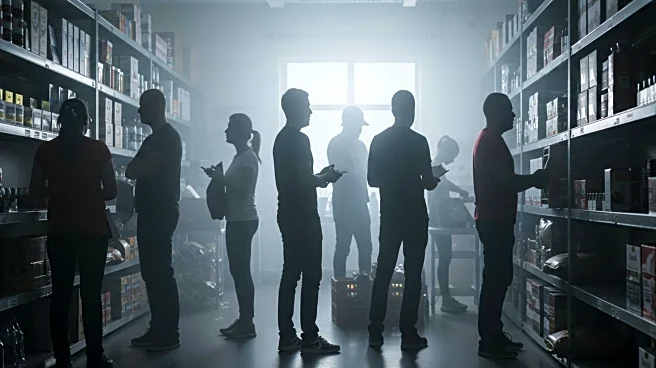What is the story about?
What's Happening?
A support group in Wolverhampton, Simple Acts of Kindness, founded by Leanne McDonald during the pandemic, is witnessing a rise in the number of employed individuals seeking assistance due to the ongoing cost of living crisis. The group, which provides household items and signposts other services, is helping six to seven families weekly across Wolverhampton, Birmingham, and the Black Country. McDonald notes that even full-time workers, including teachers and nursing staff, are struggling to afford essentials and are inquiring about food banks. The situation is exacerbated by the rising cost of living, which has also impacted the group's volunteer numbers, dropping from ten to three as some volunteers take on extra paid work to manage their own financial difficulties.
Why It's Important?
The increase in food bank usage among employed individuals highlights the severe impact of the cost of living crisis on middle-income earners. This trend underscores the financial strain on essential workers, such as teachers and nurses, who are crucial to societal functioning. The situation reflects broader economic challenges, where wages are not keeping pace with rising living costs, leading to increased reliance on charitable support. This development could have significant implications for public policy, potentially prompting calls for wage increases or additional support for essential workers. The reduction in volunteer numbers further stresses the capacity of support groups to meet growing demands, indicating a need for sustainable solutions to address the crisis.
What's Next?
Simple Acts of Kindness is organizing a fundraising event at the Golden Bar and Grill in Wolverhampton on August 30 to help cover operational costs. This initiative aims to bolster the group's resources to continue supporting those in need. Additionally, the ongoing situation may lead to increased advocacy from organizations like Citizens Advice, which has already warned about the financial pressures on low-income households. Policymakers might face mounting pressure to address wage disparities and provide more comprehensive support to mitigate the effects of the cost of living crisis.
Beyond the Headlines
The reliance on food banks by employed individuals raises ethical questions about wage adequacy and the societal value placed on essential professions. It also highlights the cultural shift towards community-based support systems in times of economic hardship. Long-term, this trend could influence public perception of economic stability and prompt discussions on the sustainability of current economic models, potentially leading to shifts in labor policies and social welfare systems.
















